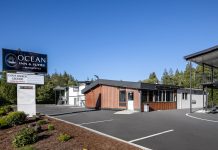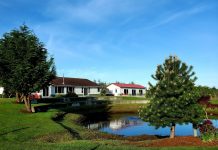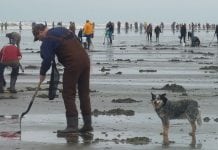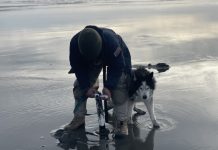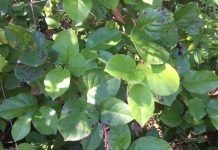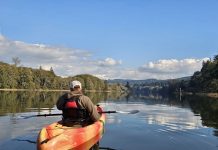This calendar is the place to find fun events happening throughout Grays Harbor County including Aberdeen, Hoquiam, Westport, Ocean Shores, Elma, Montesano and beyond.
Have an event that isn’t listed? Please email events@GraysHarborTalk.com with the following information:
- Name of Event
- Date, time and location (name of business if applicable and complete address)
- Organizer(s) name
- Cost
- URL to purchase tickets
- Website URL
- SHORT description of event
- Photo
Our editors will review and post within a few business days.
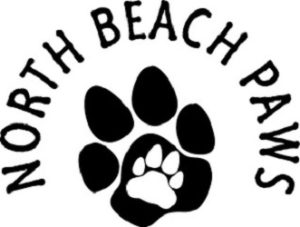
North Beach PAWS, a private, all volunteer, no-kill animal shelter headquartered in Hoquiam, is hosting its second low-cost vaccination clinic of 2024 scheduled for Saturday, June 15, from 10 a.m. – 2 p.m. at the South Beach Regional Fire Authority Training Center located at 805 WA-105 in Westport. Vaccinations and microchips are $20 each. Core vaccines include rabies, DAPP, and Bordetella for dogs, and rabies and FVRCP for cats. Flea treatment for cats will also be available for $20. North Beach PAWS recently held a vaccination clinic at The Feed Bin in Rochester where approximately 60 animals received vaccinations and/or microchips.
No appointments are needed or will be accepted, the event is first-come, first-served. Dogs must be on a leash and cats must be in carriers.
Remaining North Beach PAWS 2024 Vaccination Clinics:
• Saturday, June 15 in Westport at the South Beach Regional Fire Authority Training
Center from 10 a.m. – 2 p.m.
• Sunday, July 14 in Montesano at Farm and Home from 1 – 4 p.m.
• Saturday, August 10 in Aberdeen at Grays Harbor College from 10 a.m. – 2 p.m.
• Saturday, September 21 in Ocean Shores at ACE Hardware from 10 a.m. – 2 p.m.

North Beach PAWS, a private, all volunteer, no-kill animal shelter headquartered in Hoquiam, is hosting its second low-cost vaccination clinic of 2024 scheduled for Saturday, June 15, from 10 a.m. – 2 p.m. at the South Beach Regional Fire Authority Training Center located at 805 WA-105 in Westport. Vaccinations and microchips are $20 each. Core vaccines include rabies, DAPP, and Bordetella for dogs, and rabies and FVRCP for cats. Flea treatment for cats will also be available for $20. North Beach PAWS recently held a vaccination clinic at The Feed Bin in Rochester where approximately 60 animals received vaccinations and/or microchips.
No appointments are needed or will be accepted, the event is first-come, first-served. Dogs must be on a leash and cats must be in carriers.
Remaining North Beach PAWS 2024 Vaccination Clinics:
• Saturday, June 15 in Westport at the South Beach Regional Fire Authority Training
Center from 10 a.m. – 2 p.m.
• Sunday, July 14 in Montesano at Farm and Home from 1 – 4 p.m.
• Saturday, August 10 in Aberdeen at Grays Harbor College from 10 a.m. – 2 p.m.
• Saturday, September 21 in Ocean Shores at ACE Hardware from 10 a.m. – 2 p.m.

North Beach PAWS, a private, all volunteer, no-kill animal shelter headquartered in Hoquiam, is hosting its second low-cost vaccination clinic of 2024 scheduled for Saturday, June 15, from 10 a.m. – 2 p.m. at the South Beach Regional Fire Authority Training Center located at 805 WA-105 in Westport. Vaccinations and microchips are $20 each. Core vaccines include rabies, DAPP, and Bordetella for dogs, and rabies and FVRCP for cats. Flea treatment for cats will also be available for $20. North Beach PAWS recently held a vaccination clinic at The Feed Bin in Rochester where approximately 60 animals received vaccinations and/or microchips.
No appointments are needed or will be accepted, the event is first-come, first-served. Dogs must be on a leash and cats must be in carriers.
Remaining North Beach PAWS 2024 Vaccination Clinics:
• Saturday, June 15 in Westport at the South Beach Regional Fire Authority Training
Center from 10 a.m. – 2 p.m.
• Sunday, July 14 in Montesano at Farm and Home from 1 – 4 p.m.
• Saturday, August 10 in Aberdeen at Grays Harbor College from 10 a.m. – 2 p.m.
• Saturday, September 21 in Ocean Shores at ACE Hardware from 10 a.m. – 2 p.m.
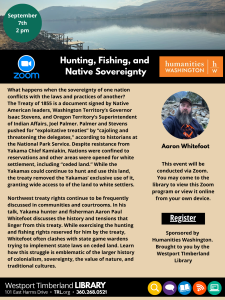
Humanities Washington Speaker Event:
Hunting, Fishing, and Native Sovereignty-Aaron Whitefoot
What happens when the sovereignty of one nation conflicts with the laws and practices of another?
The Treaty of 1855 is a document signed by Native American leaders, Washington Territory’s Governor Isaac Stevens, and Oregon Territory’s Superintendent of Indian Affairs, Joel Palmer. Palmer and Stevens pushed for “exploitative treaties” by “cajoling and threatening the delegates,” according to historians at the National Park Service. Despite resistance from Yakama Chief Kamiakin, Nations were confined to reservations and other areas were opened for white settlement, including “ceded land.” While the Yakamas could continue to hunt and use this land, the treaty removed the Yakamas’ exclusive use of it, granting wide access to of the land to white settlers.
Northwest treaty rights continue to be frequently discussed in communities and courtrooms. In his talk, Yakama hunter and fisherman Aaron Paul Whitefoot discusses the history and tensions that linger from this treaty. While exercising the hunting and fishing rights reserved for him by the treaty, Whitefoot often clashes with state game wardens trying to implement state laws on ceded land. Learn how this struggle is emblematic of the larger history of colonialism, sovereignty, the value of nature, and traditional cultures.

North Beach PAWS, a private, all volunteer, no-kill animal shelter headquartered in Hoquiam, is hosting its second low-cost vaccination clinic of 2024 scheduled for Saturday, June 15, from 10 a.m. – 2 p.m. at the South Beach Regional Fire Authority Training Center located at 805 WA-105 in Westport. Vaccinations and microchips are $20 each. Core vaccines include rabies, DAPP, and Bordetella for dogs, and rabies and FVRCP for cats. Flea treatment for cats will also be available for $20. North Beach PAWS recently held a vaccination clinic at The Feed Bin in Rochester where approximately 60 animals received vaccinations and/or microchips.
No appointments are needed or will be accepted, the event is first-come, first-served. Dogs must be on a leash and cats must be in carriers.
Remaining North Beach PAWS 2024 Vaccination Clinics:
• Saturday, June 15 in Westport at the South Beach Regional Fire Authority Training
Center from 10 a.m. – 2 p.m.
• Sunday, July 14 in Montesano at Farm and Home from 1 – 4 p.m.
• Saturday, August 10 in Aberdeen at Grays Harbor College from 10 a.m. – 2 p.m.
• Saturday, September 21 in Ocean Shores at ACE Hardware from 10 a.m. – 2 p.m.

Humanities Washington Speaker Event:
Race, Gender, and Monsters: What Vampires and Werewolves Reveal About Ourselves and Our Culture- Bernadette Calafell
Why do some monsters seem to resonate through time?
What do they say about our social and cultural anxieties around difference—in particular race, class, gender, sexuality, nationality, and ability?
This talk explores the shifting meanings vampires and werewolves have taken in popular culture, with a particular focus on the 1980s through the 2000s. In addition, these figures will be compared to the early Universal horror film monsters Dracula and The Wolf Man. Discover how the monsters we love tell us a great deal about ourselves and our changing cultural ideas about difference.

Humanities Washington Speaker Event:
What is a Chief? How native Values Can Teach Resilience-John Halliday
Most museums display no more than 10 percent of their holdings, often citing “not enough space” as the reason. But there are also a wide range of cultural, philosophical, political, environmental, historic, and even superstitious reasons why museums keep some objects from public view.
In this talk, explore a wide range of hidden objects found in the back rooms of museums in our state and around the country. Examples include a Spokane institution that holds Bing Crosby’s toupées and a museum in Lynden that’s home to a 150-year-old pickle. When possible, we will have local museum curators on hand to answer questions, participate in our discussions, and unbox a few hidden treasures.
North Beach PAWS — a private, independent, no-kill animal shelter dedicated to saving the lives of unwanted and homeless dogs and cats — is hosting a VOLUNTEER RECRUITMENT EVENT Sunday, November 17th at 2 p.m.! Are you looking to make a difference in the lives of local animals? Whether you want to work with adorable cats and dogs, help out at the weekly garage sale, or support their mission in other ways, there’s a role for everyone! Space is limited, so please contact North Beach PAWS to reserve your spot. Bring a friend who’s as passionate as you are. The event will take place at North Beach PAWS, which is conveniently located at 2222 State Route 109 just outside Ocean Shores near Hogan’s Corner. Call 360-660-4178 to RSVP!
November 19, 2024, Hoquiam, WA – Public Health is proud to announce the premiere of the 28-minute documentary, “Voices of Resilience,” which shines a powerful light on the issues of housing, homelessness, and the human experiences that inspire hope, recovery, and transformation.
Inspired by an outreach event in Fall 2022, Voices of Resilience shares the deeply moving stories of individuals who have experienced homelessness but have since found stable housing, sobriety, and a renewed sense of community. The documentary also features interviews with service providers who work tirelessly alongside these individuals, helping to support them in their journey of healing and growth.
Audience feedback from various community groups—including business owners, service providers, government representatives from the WA Department of Health (DOH) and Department of Commerce, as well as individuals featured in the film—has been overwhelmingly positive. Viewers have described the documentary as an uplifting and much-needed message of hope, particularly during the holiday season. The film underscores the successful elements that contribute to lasting, transformative change, offering a hopeful vision for addressing homelessness in our community.
We are excited to invite you to the Grand Premiere Screening of the documentary, “Voices of Resilience!”
Join us on Thursday, December 5th, 2024, for an inspiring evening at the 7th Street Theatre in Hoquiam. The screening will begin at 6:30 p.m. and will be followed by a Q&A session with the documentary’s cast, including individuals featured in the film, service providers, law enforcement officers, and Public Health staff.
This is a unique opportunity to engage with those who have firsthand experience and those working on the frontlines to create meaningful change in our community. The event promises to be both informative and inspiring, offering a chance to connect with others who share the goal of making a difference in the lives of those affected by homelessness.
- Admission: FREE! (Popcorn is on us!)
- RSVP: RSVP is not required, but it is recommended through the following link:
https://voicesofresilience.splashthat.com
Important Note from Theatre Management: To ensure the preservation of the historic theatre, please note the following:
- Only bottled drinks (soda or water) are allowed in the auditorium. No cans or open cups.
- Sticky foods such as cotton candy, candied popcorn, or similar items are prohibited.
This event is a unique opportunity to be part of an important conversation about homelessness, resilience, and the transformative power of community support. We are grateful to everyone who contributed to this project, especially Rick Moyer of Moyer Multimedia, whose expertise made this documentary truly special.
We look forward to seeing you at this impactful event. Together, we can continue to build a more compassionate, supportive, and resilient community.

Humanities Washington Speaker Event: Weird, Wonderful, and Worrisome Objects in Washington State’s Museums-Harriet Baskas
Most museums display no more than 10 percent of their holdings, often citing “not enough space” as the reason. But there are also a wide range of cultural, philosophical, political, environmental, historic, and even superstitious reasons why museums keep some objects from public view.
In this talk, explore a wide range of hidden objects found in the back rooms of museums in our state and around the country. Examples include a Spokane institution that holds Bing Crosby’s toupées and a museum in Lynden that’s home to a 150-year-old pickle. When possible, we will have local museum curators on hand to answer questions, participate in our discussions, and unbox a few hidden treasures.
This is an online event may view the presentation from home or visit the library to view this online event.
Please join us to meet and welcome Louisa Schreier of Grays Harbor EMS. She has put together a special presentation for us all “EMS in Grays Harbor County – a Unique System”. Meetings are held in person or on Microsoft Teams. We look forward to seeing you there!
Microsoft Teams meeting
Join on your computer, mobile app or room device
Click here to join the meeting
Meeting ID: 214 278 981 71
Passcode: MLPKaM
Download Teams | Join on the web
Heartsaver First Aid, CPR, AED: Adult, child & infant for lay person
? 9am – 2pm
? Cost $85.00 – includes required book
? To receive your Heartsaver ecard, you must have a valid
email address
*Add the Bloodborne Pathogens Course to any Heartsaver
Course. Exposure to HIV, AIDS, bodily fluid, etc. The
bloodborne pathogens course takes approximately 45
minutes and immediately follows the Heartsaver Course.
? Cost: $15.00 – includes required boo
WDFW approves seven days of coastal razor clam digs starting Jan. 10; more digs planned through March 1
Washington Department of Fish and Wildlife (WDFW) shellfish managers confirmed seven days of razor clam digs on coastal beaches beginning Jan. 10.
“This upcoming tide series should be a good one for daylight digging opportunity, with weekend low tide times occurring before or just after sunset,” said Bryce Blumenthal, WDFW’s recreational razor clam manager. “Clam diggers have had mixed success with recent weather, but we expect improved conditions — and easier digging — as winter approaches spring.”
Not all coastal beaches are open for every dig, so diggers are encouraged to make sure their intended destination is open before heading out. No digging is allowed before noon during digs when low tide occurs in the afternoon or evening. Most successful digging occurs between one and two hours before the listed time of low tide.
The following digs during evening (p.m.) low tides will proceed as scheduled, after marine toxin results from the Washington State Department of Health (DOH) showed razor clams are safe to eat:
- Jan 10, Friday, 3:47 p.m.; -0.3 feet; Long Beach, Twin Harbors, Mocrocks
- Jan 11, Saturday, 4:39 p.m.; -0.8 feet; Long Beach, Twin Harbors, Mocrocks
- Jan 12, Sunday, 5:27 p.m.; -1.0 feet; Long Beach, Twin Harbors, Copalis
- Jan 13, Monday, 6:10 p.m.; -1.1 feet; Long Beach, Twin Harbors, Copalis
- Jan 14, Tuesday, 6:50 p.m.; -0.9 feet; Long Beach, Twin Harbors, Mocrocks
- Jan 15, Wednesday, 7:28 p.m.; -0.6 feet; Long Beach, Twin Harbors, Mocrocks
- Jan 16, Thursday, 8:03 p.m.; -0.2 feet; Long Beach, Twin Harbors, Copalis
Below are additional tentative dates:
- Jan 26, Sunday, 4:34 p.m.; 0.1 feet; Long Beach, Twin Harbors, Mocrocks
- Jan 27, Monday, 5:15 p.m.; -0.4 feet; Long Beach, Twin Harbors, Mocrocks
- Jan 28, Tuesday, 5:54 p.m.; -0.8 feet; Long Beach, Twin Harbors, Copalis
- Jan 29, Wednesday, 6:31 p.m.; -1.0 feet; Long Beach, Twin Harbors, Copalis
- Jan 30, Thursday, 7:07 p.m.; -1.0 feet; Long Beach, Twin Harbors, Mocrocks
- Jan 31, Friday, 7:44 p.m.; -0.7 feet; Long Beach, Twin Harbors, Mocrocks
- Feb 1, Saturday, 8:21 p.m.; -0.1 feet; Long Beach, Twin Harbors, Copalis
- Feb 8, Saturday, 3:36 p.m.; 0.1 feet; Long Beach, Twin Harbors, Mocrocks
- Feb 9, Sunday, 4:29 p.m.; -0.3 feet; Long Beach, Twin Harbors, Copalis
- Feb 10, Monday, 5:15 p.m.; -0.5 feet; Long Beach, Twin Harbors, Copalis
- Feb 11, Tuesday, 5:54 p.m.; -0.5 feet; Long Beach, Twin Harbors, Mocrocks
- Feb 12, Wednesday, 6:29 p.m.; -0.4 feet; Long Beach, Twin Harbors, Mocrocks
- Feb 13, Thursday, 7:01 p.m.; -0.1 feet; Long Beach, Twin Harbors, Copalis
- Feb 14, Friday, 7:32 p.m.; 0.4 feet; Long Beach, Twin Harbors, Copalis
- Feb 24, Monday, 4:04 p.m.; 0.2 feet; Long Beach, Twin Harbors, Mocrocks
- Feb 25, Tuesday, 4:46 p.m.; -0.3 feet; Long Beach, Twin Harbors, Copalis
- Feb 26, Wednesday, 5:25 p.m.; -0.6 feet; Long Beach, Twin Harbors, Copalis
- Feb 27, Thursday, 6:03 p.m.; -0.7 feet; Long Beach, Twin Harbors, Mocrocks
- Feb 28, Friday, 6:39 p.m.; -0.6 feet; Long Beach, Twin Harbors, Mocrocks
- March 1, Saturday, 7:15 p.m.; -0.1 feet; Long Beach, Twin Harbors, Copalis
DOH requires test samples for marine toxins, and domoic acid levels must fall under the guideline level before a beach can open for digging. Domoic acid, a natural toxin produced by certain types of marine algae, can be harmful or fatal if consumed in sufficient quantities. Final approval usually occurs about a week or less before the start of each digging series. More information about domoic acid, as well as current levels at ocean beaches, can be found on WDFW’s domoic acid webpage.
On all open beaches, the daily limit is 15 clams per person. Each digger’s clams must be kept in a separate container, and all diggers must keep the first 15 clams they dig, regardless of size or condition, to prevent waste.
All diggers 15 or older must have an applicable fishing license to harvest razor clams on any beach. Licenses can be purchased from WDFW’s licensing website and from hundreds of license vendors around the state. WDFW recommends buying your license before visiting coastal beach communities.
The 2024-25 Razor Clam Management Plan is available on WDFW’s website. For more information, refer to WDFW’s razor clam webpage.
The Washington Department of Fish and Wildlife works to preserve, protect, and perpetuate fish, wildlife and ecosystems while providing sustainable fish and wildlife recreational and commercial opportunities.
WDFW approves seven days of coastal razor clam digs starting Jan. 10; more digs planned through March 1
Washington Department of Fish and Wildlife (WDFW) shellfish managers confirmed seven days of razor clam digs on coastal beaches beginning Jan. 10.
“This upcoming tide series should be a good one for daylight digging opportunity, with weekend low tide times occurring before or just after sunset,” said Bryce Blumenthal, WDFW’s recreational razor clam manager. “Clam diggers have had mixed success with recent weather, but we expect improved conditions — and easier digging — as winter approaches spring.”
Not all coastal beaches are open for every dig, so diggers are encouraged to make sure their intended destination is open before heading out. No digging is allowed before noon during digs when low tide occurs in the afternoon or evening. Most successful digging occurs between one and two hours before the listed time of low tide.
The following digs during evening (p.m.) low tides will proceed as scheduled, after marine toxin results from the Washington State Department of Health (DOH) showed razor clams are safe to eat:
- Jan 10, Friday, 3:47 p.m.; -0.3 feet; Long Beach, Twin Harbors, Mocrocks
- Jan 11, Saturday, 4:39 p.m.; -0.8 feet; Long Beach, Twin Harbors, Mocrocks
- Jan 12, Sunday, 5:27 p.m.; -1.0 feet; Long Beach, Twin Harbors, Copalis
- Jan 13, Monday, 6:10 p.m.; -1.1 feet; Long Beach, Twin Harbors, Copalis
- Jan 14, Tuesday, 6:50 p.m.; -0.9 feet; Long Beach, Twin Harbors, Mocrocks
- Jan 15, Wednesday, 7:28 p.m.; -0.6 feet; Long Beach, Twin Harbors, Mocrocks
- Jan 16, Thursday, 8:03 p.m.; -0.2 feet; Long Beach, Twin Harbors, Copalis
Below are additional tentative dates:
- Jan 26, Sunday, 4:34 p.m.; 0.1 feet; Long Beach, Twin Harbors, Mocrocks
- Jan 27, Monday, 5:15 p.m.; -0.4 feet; Long Beach, Twin Harbors, Mocrocks
- Jan 28, Tuesday, 5:54 p.m.; -0.8 feet; Long Beach, Twin Harbors, Copalis
- Jan 29, Wednesday, 6:31 p.m.; -1.0 feet; Long Beach, Twin Harbors, Copalis
- Jan 30, Thursday, 7:07 p.m.; -1.0 feet; Long Beach, Twin Harbors, Mocrocks
- Jan 31, Friday, 7:44 p.m.; -0.7 feet; Long Beach, Twin Harbors, Mocrocks
- Feb 1, Saturday, 8:21 p.m.; -0.1 feet; Long Beach, Twin Harbors, Copalis
- Feb 8, Saturday, 3:36 p.m.; 0.1 feet; Long Beach, Twin Harbors, Mocrocks
- Feb 9, Sunday, 4:29 p.m.; -0.3 feet; Long Beach, Twin Harbors, Copalis
- Feb 10, Monday, 5:15 p.m.; -0.5 feet; Long Beach, Twin Harbors, Copalis
- Feb 11, Tuesday, 5:54 p.m.; -0.5 feet; Long Beach, Twin Harbors, Mocrocks
- Feb 12, Wednesday, 6:29 p.m.; -0.4 feet; Long Beach, Twin Harbors, Mocrocks
- Feb 13, Thursday, 7:01 p.m.; -0.1 feet; Long Beach, Twin Harbors, Copalis
- Feb 14, Friday, 7:32 p.m.; 0.4 feet; Long Beach, Twin Harbors, Copalis
- Feb 24, Monday, 4:04 p.m.; 0.2 feet; Long Beach, Twin Harbors, Mocrocks
- Feb 25, Tuesday, 4:46 p.m.; -0.3 feet; Long Beach, Twin Harbors, Copalis
- Feb 26, Wednesday, 5:25 p.m.; -0.6 feet; Long Beach, Twin Harbors, Copalis
- Feb 27, Thursday, 6:03 p.m.; -0.7 feet; Long Beach, Twin Harbors, Mocrocks
- Feb 28, Friday, 6:39 p.m.; -0.6 feet; Long Beach, Twin Harbors, Mocrocks
- March 1, Saturday, 7:15 p.m.; -0.1 feet; Long Beach, Twin Harbors, Copalis
DOH requires test samples for marine toxins, and domoic acid levels must fall under the guideline level before a beach can open for digging. Domoic acid, a natural toxin produced by certain types of marine algae, can be harmful or fatal if consumed in sufficient quantities. Final approval usually occurs about a week or less before the start of each digging series. More information about domoic acid, as well as current levels at ocean beaches, can be found on WDFW’s domoic acid webpage.
On all open beaches, the daily limit is 15 clams per person. Each digger’s clams must be kept in a separate container, and all diggers must keep the first 15 clams they dig, regardless of size or condition, to prevent waste.
All diggers 15 or older must have an applicable fishing license to harvest razor clams on any beach. Licenses can be purchased from WDFW’s licensing website and from hundreds of license vendors around the state. WDFW recommends buying your license before visiting coastal beach communities.
The 2024-25 Razor Clam Management Plan is available on WDFW’s website. For more information, refer to WDFW’s razor clam webpage.
The Washington Department of Fish and Wildlife works to preserve, protect, and perpetuate fish, wildlife and ecosystems while providing sustainable fish and wildlife recreational and commercial opportunities.
WDFW approves seven days of coastal razor clam digs starting Jan. 10; more digs planned through March 1
Washington Department of Fish and Wildlife (WDFW) shellfish managers confirmed seven days of razor clam digs on coastal beaches beginning Jan. 10.
“This upcoming tide series should be a good one for daylight digging opportunity, with weekend low tide times occurring before or just after sunset,” said Bryce Blumenthal, WDFW’s recreational razor clam manager. “Clam diggers have had mixed success with recent weather, but we expect improved conditions — and easier digging — as winter approaches spring.”
Not all coastal beaches are open for every dig, so diggers are encouraged to make sure their intended destination is open before heading out. No digging is allowed before noon during digs when low tide occurs in the afternoon or evening. Most successful digging occurs between one and two hours before the listed time of low tide.
The following digs during evening (p.m.) low tides will proceed as scheduled, after marine toxin results from the Washington State Department of Health (DOH) showed razor clams are safe to eat:
- Jan 10, Friday, 3:47 p.m.; -0.3 feet; Long Beach, Twin Harbors, Mocrocks
- Jan 11, Saturday, 4:39 p.m.; -0.8 feet; Long Beach, Twin Harbors, Mocrocks
- Jan 12, Sunday, 5:27 p.m.; -1.0 feet; Long Beach, Twin Harbors, Copalis
- Jan 13, Monday, 6:10 p.m.; -1.1 feet; Long Beach, Twin Harbors, Copalis
- Jan 14, Tuesday, 6:50 p.m.; -0.9 feet; Long Beach, Twin Harbors, Mocrocks
- Jan 15, Wednesday, 7:28 p.m.; -0.6 feet; Long Beach, Twin Harbors, Mocrocks
- Jan 16, Thursday, 8:03 p.m.; -0.2 feet; Long Beach, Twin Harbors, Copalis
Below are additional tentative dates:
- Jan 26, Sunday, 4:34 p.m.; 0.1 feet; Long Beach, Twin Harbors, Mocrocks
- Jan 27, Monday, 5:15 p.m.; -0.4 feet; Long Beach, Twin Harbors, Mocrocks
- Jan 28, Tuesday, 5:54 p.m.; -0.8 feet; Long Beach, Twin Harbors, Copalis
- Jan 29, Wednesday, 6:31 p.m.; -1.0 feet; Long Beach, Twin Harbors, Copalis
- Jan 30, Thursday, 7:07 p.m.; -1.0 feet; Long Beach, Twin Harbors, Mocrocks
- Jan 31, Friday, 7:44 p.m.; -0.7 feet; Long Beach, Twin Harbors, Mocrocks
- Feb 1, Saturday, 8:21 p.m.; -0.1 feet; Long Beach, Twin Harbors, Copalis
- Feb 8, Saturday, 3:36 p.m.; 0.1 feet; Long Beach, Twin Harbors, Mocrocks
- Feb 9, Sunday, 4:29 p.m.; -0.3 feet; Long Beach, Twin Harbors, Copalis
- Feb 10, Monday, 5:15 p.m.; -0.5 feet; Long Beach, Twin Harbors, Copalis
- Feb 11, Tuesday, 5:54 p.m.; -0.5 feet; Long Beach, Twin Harbors, Mocrocks
- Feb 12, Wednesday, 6:29 p.m.; -0.4 feet; Long Beach, Twin Harbors, Mocrocks
- Feb 13, Thursday, 7:01 p.m.; -0.1 feet; Long Beach, Twin Harbors, Copalis
- Feb 14, Friday, 7:32 p.m.; 0.4 feet; Long Beach, Twin Harbors, Copalis
- Feb 24, Monday, 4:04 p.m.; 0.2 feet; Long Beach, Twin Harbors, Mocrocks
- Feb 25, Tuesday, 4:46 p.m.; -0.3 feet; Long Beach, Twin Harbors, Copalis
- Feb 26, Wednesday, 5:25 p.m.; -0.6 feet; Long Beach, Twin Harbors, Copalis
- Feb 27, Thursday, 6:03 p.m.; -0.7 feet; Long Beach, Twin Harbors, Mocrocks
- Feb 28, Friday, 6:39 p.m.; -0.6 feet; Long Beach, Twin Harbors, Mocrocks
- March 1, Saturday, 7:15 p.m.; -0.1 feet; Long Beach, Twin Harbors, Copalis
DOH requires test samples for marine toxins, and domoic acid levels must fall under the guideline level before a beach can open for digging. Domoic acid, a natural toxin produced by certain types of marine algae, can be harmful or fatal if consumed in sufficient quantities. Final approval usually occurs about a week or less before the start of each digging series. More information about domoic acid, as well as current levels at ocean beaches, can be found on WDFW’s domoic acid webpage.
On all open beaches, the daily limit is 15 clams per person. Each digger’s clams must be kept in a separate container, and all diggers must keep the first 15 clams they dig, regardless of size or condition, to prevent waste.
All diggers 15 or older must have an applicable fishing license to harvest razor clams on any beach. Licenses can be purchased from WDFW’s licensing website and from hundreds of license vendors around the state. WDFW recommends buying your license before visiting coastal beach communities.
The 2024-25 Razor Clam Management Plan is available on WDFW’s website. For more information, refer to WDFW’s razor clam webpage.
The Washington Department of Fish and Wildlife works to preserve, protect, and perpetuate fish, wildlife and ecosystems while providing sustainable fish and wildlife recreational and commercial opportunities.
WDFW approves seven days of coastal razor clam digs starting Jan. 10; more digs planned through March 1
Washington Department of Fish and Wildlife (WDFW) shellfish managers confirmed seven days of razor clam digs on coastal beaches beginning Jan. 10.
“This upcoming tide series should be a good one for daylight digging opportunity, with weekend low tide times occurring before or just after sunset,” said Bryce Blumenthal, WDFW’s recreational razor clam manager. “Clam diggers have had mixed success with recent weather, but we expect improved conditions — and easier digging — as winter approaches spring.”
Not all coastal beaches are open for every dig, so diggers are encouraged to make sure their intended destination is open before heading out. No digging is allowed before noon during digs when low tide occurs in the afternoon or evening. Most successful digging occurs between one and two hours before the listed time of low tide.
The following digs during evening (p.m.) low tides will proceed as scheduled, after marine toxin results from the Washington State Department of Health (DOH) showed razor clams are safe to eat:
- Jan 10, Friday, 3:47 p.m.; -0.3 feet; Long Beach, Twin Harbors, Mocrocks
- Jan 11, Saturday, 4:39 p.m.; -0.8 feet; Long Beach, Twin Harbors, Mocrocks
- Jan 12, Sunday, 5:27 p.m.; -1.0 feet; Long Beach, Twin Harbors, Copalis
- Jan 13, Monday, 6:10 p.m.; -1.1 feet; Long Beach, Twin Harbors, Copalis
- Jan 14, Tuesday, 6:50 p.m.; -0.9 feet; Long Beach, Twin Harbors, Mocrocks
- Jan 15, Wednesday, 7:28 p.m.; -0.6 feet; Long Beach, Twin Harbors, Mocrocks
- Jan 16, Thursday, 8:03 p.m.; -0.2 feet; Long Beach, Twin Harbors, Copalis
Below are additional tentative dates:
- Jan 26, Sunday, 4:34 p.m.; 0.1 feet; Long Beach, Twin Harbors, Mocrocks
- Jan 27, Monday, 5:15 p.m.; -0.4 feet; Long Beach, Twin Harbors, Mocrocks
- Jan 28, Tuesday, 5:54 p.m.; -0.8 feet; Long Beach, Twin Harbors, Copalis
- Jan 29, Wednesday, 6:31 p.m.; -1.0 feet; Long Beach, Twin Harbors, Copalis
- Jan 30, Thursday, 7:07 p.m.; -1.0 feet; Long Beach, Twin Harbors, Mocrocks
- Jan 31, Friday, 7:44 p.m.; -0.7 feet; Long Beach, Twin Harbors, Mocrocks
- Feb 1, Saturday, 8:21 p.m.; -0.1 feet; Long Beach, Twin Harbors, Copalis
- Feb 8, Saturday, 3:36 p.m.; 0.1 feet; Long Beach, Twin Harbors, Mocrocks
- Feb 9, Sunday, 4:29 p.m.; -0.3 feet; Long Beach, Twin Harbors, Copalis
- Feb 10, Monday, 5:15 p.m.; -0.5 feet; Long Beach, Twin Harbors, Copalis
- Feb 11, Tuesday, 5:54 p.m.; -0.5 feet; Long Beach, Twin Harbors, Mocrocks
- Feb 12, Wednesday, 6:29 p.m.; -0.4 feet; Long Beach, Twin Harbors, Mocrocks
- Feb 13, Thursday, 7:01 p.m.; -0.1 feet; Long Beach, Twin Harbors, Copalis
- Feb 14, Friday, 7:32 p.m.; 0.4 feet; Long Beach, Twin Harbors, Copalis
- Feb 24, Monday, 4:04 p.m.; 0.2 feet; Long Beach, Twin Harbors, Mocrocks
- Feb 25, Tuesday, 4:46 p.m.; -0.3 feet; Long Beach, Twin Harbors, Copalis
- Feb 26, Wednesday, 5:25 p.m.; -0.6 feet; Long Beach, Twin Harbors, Copalis
- Feb 27, Thursday, 6:03 p.m.; -0.7 feet; Long Beach, Twin Harbors, Mocrocks
- Feb 28, Friday, 6:39 p.m.; -0.6 feet; Long Beach, Twin Harbors, Mocrocks
- March 1, Saturday, 7:15 p.m.; -0.1 feet; Long Beach, Twin Harbors, Copalis
DOH requires test samples for marine toxins, and domoic acid levels must fall under the guideline level before a beach can open for digging. Domoic acid, a natural toxin produced by certain types of marine algae, can be harmful or fatal if consumed in sufficient quantities. Final approval usually occurs about a week or less before the start of each digging series. More information about domoic acid, as well as current levels at ocean beaches, can be found on WDFW’s domoic acid webpage.
On all open beaches, the daily limit is 15 clams per person. Each digger’s clams must be kept in a separate container, and all diggers must keep the first 15 clams they dig, regardless of size or condition, to prevent waste.
All diggers 15 or older must have an applicable fishing license to harvest razor clams on any beach. Licenses can be purchased from WDFW’s licensing website and from hundreds of license vendors around the state. WDFW recommends buying your license before visiting coastal beach communities.
The 2024-25 Razor Clam Management Plan is available on WDFW’s website. For more information, refer to WDFW’s razor clam webpage.
The Washington Department of Fish and Wildlife works to preserve, protect, and perpetuate fish, wildlife and ecosystems while providing sustainable fish and wildlife recreational and commercial opportunities.
WDFW approves seven days of coastal razor clam digs starting Jan. 10; more digs planned through March 1
Washington Department of Fish and Wildlife (WDFW) shellfish managers confirmed seven days of razor clam digs on coastal beaches beginning Jan. 10.
“This upcoming tide series should be a good one for daylight digging opportunity, with weekend low tide times occurring before or just after sunset,” said Bryce Blumenthal, WDFW’s recreational razor clam manager. “Clam diggers have had mixed success with recent weather, but we expect improved conditions — and easier digging — as winter approaches spring.”
Not all coastal beaches are open for every dig, so diggers are encouraged to make sure their intended destination is open before heading out. No digging is allowed before noon during digs when low tide occurs in the afternoon or evening. Most successful digging occurs between one and two hours before the listed time of low tide.
The following digs during evening (p.m.) low tides will proceed as scheduled, after marine toxin results from the Washington State Department of Health (DOH) showed razor clams are safe to eat:
- Jan 10, Friday, 3:47 p.m.; -0.3 feet; Long Beach, Twin Harbors, Mocrocks
- Jan 11, Saturday, 4:39 p.m.; -0.8 feet; Long Beach, Twin Harbors, Mocrocks
- Jan 12, Sunday, 5:27 p.m.; -1.0 feet; Long Beach, Twin Harbors, Copalis
- Jan 13, Monday, 6:10 p.m.; -1.1 feet; Long Beach, Twin Harbors, Copalis
- Jan 14, Tuesday, 6:50 p.m.; -0.9 feet; Long Beach, Twin Harbors, Mocrocks
- Jan 15, Wednesday, 7:28 p.m.; -0.6 feet; Long Beach, Twin Harbors, Mocrocks
- Jan 16, Thursday, 8:03 p.m.; -0.2 feet; Long Beach, Twin Harbors, Copalis
Below are additional tentative dates:
- Jan 26, Sunday, 4:34 p.m.; 0.1 feet; Long Beach, Twin Harbors, Mocrocks
- Jan 27, Monday, 5:15 p.m.; -0.4 feet; Long Beach, Twin Harbors, Mocrocks
- Jan 28, Tuesday, 5:54 p.m.; -0.8 feet; Long Beach, Twin Harbors, Copalis
- Jan 29, Wednesday, 6:31 p.m.; -1.0 feet; Long Beach, Twin Harbors, Copalis
- Jan 30, Thursday, 7:07 p.m.; -1.0 feet; Long Beach, Twin Harbors, Mocrocks
- Jan 31, Friday, 7:44 p.m.; -0.7 feet; Long Beach, Twin Harbors, Mocrocks
- Feb 1, Saturday, 8:21 p.m.; -0.1 feet; Long Beach, Twin Harbors, Copalis
- Feb 8, Saturday, 3:36 p.m.; 0.1 feet; Long Beach, Twin Harbors, Mocrocks
- Feb 9, Sunday, 4:29 p.m.; -0.3 feet; Long Beach, Twin Harbors, Copalis
- Feb 10, Monday, 5:15 p.m.; -0.5 feet; Long Beach, Twin Harbors, Copalis
- Feb 11, Tuesday, 5:54 p.m.; -0.5 feet; Long Beach, Twin Harbors, Mocrocks
- Feb 12, Wednesday, 6:29 p.m.; -0.4 feet; Long Beach, Twin Harbors, Mocrocks
- Feb 13, Thursday, 7:01 p.m.; -0.1 feet; Long Beach, Twin Harbors, Copalis
- Feb 14, Friday, 7:32 p.m.; 0.4 feet; Long Beach, Twin Harbors, Copalis
- Feb 24, Monday, 4:04 p.m.; 0.2 feet; Long Beach, Twin Harbors, Mocrocks
- Feb 25, Tuesday, 4:46 p.m.; -0.3 feet; Long Beach, Twin Harbors, Copalis
- Feb 26, Wednesday, 5:25 p.m.; -0.6 feet; Long Beach, Twin Harbors, Copalis
- Feb 27, Thursday, 6:03 p.m.; -0.7 feet; Long Beach, Twin Harbors, Mocrocks
- Feb 28, Friday, 6:39 p.m.; -0.6 feet; Long Beach, Twin Harbors, Mocrocks
- March 1, Saturday, 7:15 p.m.; -0.1 feet; Long Beach, Twin Harbors, Copalis
DOH requires test samples for marine toxins, and domoic acid levels must fall under the guideline level before a beach can open for digging. Domoic acid, a natural toxin produced by certain types of marine algae, can be harmful or fatal if consumed in sufficient quantities. Final approval usually occurs about a week or less before the start of each digging series. More information about domoic acid, as well as current levels at ocean beaches, can be found on WDFW’s domoic acid webpage.
On all open beaches, the daily limit is 15 clams per person. Each digger’s clams must be kept in a separate container, and all diggers must keep the first 15 clams they dig, regardless of size or condition, to prevent waste.
All diggers 15 or older must have an applicable fishing license to harvest razor clams on any beach. Licenses can be purchased from WDFW’s licensing website and from hundreds of license vendors around the state. WDFW recommends buying your license before visiting coastal beach communities.
The 2024-25 Razor Clam Management Plan is available on WDFW’s website. For more information, refer to WDFW’s razor clam webpage.
The Washington Department of Fish and Wildlife works to preserve, protect, and perpetuate fish, wildlife and ecosystems while providing sustainable fish and wildlife recreational and commercial opportunities.
WDFW approves seven days of coastal razor clam digs starting Jan. 10; more digs planned through March 1
Washington Department of Fish and Wildlife (WDFW) shellfish managers confirmed seven days of razor clam digs on coastal beaches beginning Jan. 10.
“This upcoming tide series should be a good one for daylight digging opportunity, with weekend low tide times occurring before or just after sunset,” said Bryce Blumenthal, WDFW’s recreational razor clam manager. “Clam diggers have had mixed success with recent weather, but we expect improved conditions — and easier digging — as winter approaches spring.”
Not all coastal beaches are open for every dig, so diggers are encouraged to make sure their intended destination is open before heading out. No digging is allowed before noon during digs when low tide occurs in the afternoon or evening. Most successful digging occurs between one and two hours before the listed time of low tide.
The following digs during evening (p.m.) low tides will proceed as scheduled, after marine toxin results from the Washington State Department of Health (DOH) showed razor clams are safe to eat:
- Jan 10, Friday, 3:47 p.m.; -0.3 feet; Long Beach, Twin Harbors, Mocrocks
- Jan 11, Saturday, 4:39 p.m.; -0.8 feet; Long Beach, Twin Harbors, Mocrocks
- Jan 12, Sunday, 5:27 p.m.; -1.0 feet; Long Beach, Twin Harbors, Copalis
- Jan 13, Monday, 6:10 p.m.; -1.1 feet; Long Beach, Twin Harbors, Copalis
- Jan 14, Tuesday, 6:50 p.m.; -0.9 feet; Long Beach, Twin Harbors, Mocrocks
- Jan 15, Wednesday, 7:28 p.m.; -0.6 feet; Long Beach, Twin Harbors, Mocrocks
- Jan 16, Thursday, 8:03 p.m.; -0.2 feet; Long Beach, Twin Harbors, Copalis
Below are additional tentative dates:
- Jan 26, Sunday, 4:34 p.m.; 0.1 feet; Long Beach, Twin Harbors, Mocrocks
- Jan 27, Monday, 5:15 p.m.; -0.4 feet; Long Beach, Twin Harbors, Mocrocks
- Jan 28, Tuesday, 5:54 p.m.; -0.8 feet; Long Beach, Twin Harbors, Copalis
- Jan 29, Wednesday, 6:31 p.m.; -1.0 feet; Long Beach, Twin Harbors, Copalis
- Jan 30, Thursday, 7:07 p.m.; -1.0 feet; Long Beach, Twin Harbors, Mocrocks
- Jan 31, Friday, 7:44 p.m.; -0.7 feet; Long Beach, Twin Harbors, Mocrocks
- Feb 1, Saturday, 8:21 p.m.; -0.1 feet; Long Beach, Twin Harbors, Copalis
- Feb 8, Saturday, 3:36 p.m.; 0.1 feet; Long Beach, Twin Harbors, Mocrocks
- Feb 9, Sunday, 4:29 p.m.; -0.3 feet; Long Beach, Twin Harbors, Copalis
- Feb 10, Monday, 5:15 p.m.; -0.5 feet; Long Beach, Twin Harbors, Copalis
- Feb 11, Tuesday, 5:54 p.m.; -0.5 feet; Long Beach, Twin Harbors, Mocrocks
- Feb 12, Wednesday, 6:29 p.m.; -0.4 feet; Long Beach, Twin Harbors, Mocrocks
- Feb 13, Thursday, 7:01 p.m.; -0.1 feet; Long Beach, Twin Harbors, Copalis
- Feb 14, Friday, 7:32 p.m.; 0.4 feet; Long Beach, Twin Harbors, Copalis
- Feb 24, Monday, 4:04 p.m.; 0.2 feet; Long Beach, Twin Harbors, Mocrocks
- Feb 25, Tuesday, 4:46 p.m.; -0.3 feet; Long Beach, Twin Harbors, Copalis
- Feb 26, Wednesday, 5:25 p.m.; -0.6 feet; Long Beach, Twin Harbors, Copalis
- Feb 27, Thursday, 6:03 p.m.; -0.7 feet; Long Beach, Twin Harbors, Mocrocks
- Feb 28, Friday, 6:39 p.m.; -0.6 feet; Long Beach, Twin Harbors, Mocrocks
- March 1, Saturday, 7:15 p.m.; -0.1 feet; Long Beach, Twin Harbors, Copalis
DOH requires test samples for marine toxins, and domoic acid levels must fall under the guideline level before a beach can open for digging. Domoic acid, a natural toxin produced by certain types of marine algae, can be harmful or fatal if consumed in sufficient quantities. Final approval usually occurs about a week or less before the start of each digging series. More information about domoic acid, as well as current levels at ocean beaches, can be found on WDFW’s domoic acid webpage.
On all open beaches, the daily limit is 15 clams per person. Each digger’s clams must be kept in a separate container, and all diggers must keep the first 15 clams they dig, regardless of size or condition, to prevent waste.
All diggers 15 or older must have an applicable fishing license to harvest razor clams on any beach. Licenses can be purchased from WDFW’s licensing website and from hundreds of license vendors around the state. WDFW recommends buying your license before visiting coastal beach communities.
The 2024-25 Razor Clam Management Plan is available on WDFW’s website. For more information, refer to WDFW’s razor clam webpage.
The Washington Department of Fish and Wildlife works to preserve, protect, and perpetuate fish, wildlife and ecosystems while providing sustainable fish and wildlife recreational and commercial opportunities.
WDFW approves seven days of coastal razor clam digs starting Jan. 10; more digs planned through March 1
Washington Department of Fish and Wildlife (WDFW) shellfish managers confirmed seven days of razor clam digs on coastal beaches beginning Jan. 10.
“This upcoming tide series should be a good one for daylight digging opportunity, with weekend low tide times occurring before or just after sunset,” said Bryce Blumenthal, WDFW’s recreational razor clam manager. “Clam diggers have had mixed success with recent weather, but we expect improved conditions — and easier digging — as winter approaches spring.”
Not all coastal beaches are open for every dig, so diggers are encouraged to make sure their intended destination is open before heading out. No digging is allowed before noon during digs when low tide occurs in the afternoon or evening. Most successful digging occurs between one and two hours before the listed time of low tide.
The following digs during evening (p.m.) low tides will proceed as scheduled, after marine toxin results from the Washington State Department of Health (DOH) showed razor clams are safe to eat:
- Jan 10, Friday, 3:47 p.m.; -0.3 feet; Long Beach, Twin Harbors, Mocrocks
- Jan 11, Saturday, 4:39 p.m.; -0.8 feet; Long Beach, Twin Harbors, Mocrocks
- Jan 12, Sunday, 5:27 p.m.; -1.0 feet; Long Beach, Twin Harbors, Copalis
- Jan 13, Monday, 6:10 p.m.; -1.1 feet; Long Beach, Twin Harbors, Copalis
- Jan 14, Tuesday, 6:50 p.m.; -0.9 feet; Long Beach, Twin Harbors, Mocrocks
- Jan 15, Wednesday, 7:28 p.m.; -0.6 feet; Long Beach, Twin Harbors, Mocrocks
- Jan 16, Thursday, 8:03 p.m.; -0.2 feet; Long Beach, Twin Harbors, Copalis
Below are additional tentative dates:
- Jan 26, Sunday, 4:34 p.m.; 0.1 feet; Long Beach, Twin Harbors, Mocrocks
- Jan 27, Monday, 5:15 p.m.; -0.4 feet; Long Beach, Twin Harbors, Mocrocks
- Jan 28, Tuesday, 5:54 p.m.; -0.8 feet; Long Beach, Twin Harbors, Copalis
- Jan 29, Wednesday, 6:31 p.m.; -1.0 feet; Long Beach, Twin Harbors, Copalis
- Jan 30, Thursday, 7:07 p.m.; -1.0 feet; Long Beach, Twin Harbors, Mocrocks
- Jan 31, Friday, 7:44 p.m.; -0.7 feet; Long Beach, Twin Harbors, Mocrocks
- Feb 1, Saturday, 8:21 p.m.; -0.1 feet; Long Beach, Twin Harbors, Copalis
- Feb 8, Saturday, 3:36 p.m.; 0.1 feet; Long Beach, Twin Harbors, Mocrocks
- Feb 9, Sunday, 4:29 p.m.; -0.3 feet; Long Beach, Twin Harbors, Copalis
- Feb 10, Monday, 5:15 p.m.; -0.5 feet; Long Beach, Twin Harbors, Copalis
- Feb 11, Tuesday, 5:54 p.m.; -0.5 feet; Long Beach, Twin Harbors, Mocrocks
- Feb 12, Wednesday, 6:29 p.m.; -0.4 feet; Long Beach, Twin Harbors, Mocrocks
- Feb 13, Thursday, 7:01 p.m.; -0.1 feet; Long Beach, Twin Harbors, Copalis
- Feb 14, Friday, 7:32 p.m.; 0.4 feet; Long Beach, Twin Harbors, Copalis
- Feb 24, Monday, 4:04 p.m.; 0.2 feet; Long Beach, Twin Harbors, Mocrocks
- Feb 25, Tuesday, 4:46 p.m.; -0.3 feet; Long Beach, Twin Harbors, Copalis
- Feb 26, Wednesday, 5:25 p.m.; -0.6 feet; Long Beach, Twin Harbors, Copalis
- Feb 27, Thursday, 6:03 p.m.; -0.7 feet; Long Beach, Twin Harbors, Mocrocks
- Feb 28, Friday, 6:39 p.m.; -0.6 feet; Long Beach, Twin Harbors, Mocrocks
- March 1, Saturday, 7:15 p.m.; -0.1 feet; Long Beach, Twin Harbors, Copalis
DOH requires test samples for marine toxins, and domoic acid levels must fall under the guideline level before a beach can open for digging. Domoic acid, a natural toxin produced by certain types of marine algae, can be harmful or fatal if consumed in sufficient quantities. Final approval usually occurs about a week or less before the start of each digging series. More information about domoic acid, as well as current levels at ocean beaches, can be found on WDFW’s domoic acid webpage.
On all open beaches, the daily limit is 15 clams per person. Each digger’s clams must be kept in a separate container, and all diggers must keep the first 15 clams they dig, regardless of size or condition, to prevent waste.
All diggers 15 or older must have an applicable fishing license to harvest razor clams on any beach. Licenses can be purchased from WDFW’s licensing website and from hundreds of license vendors around the state. WDFW recommends buying your license before visiting coastal beach communities.
The 2024-25 Razor Clam Management Plan is available on WDFW’s website. For more information, refer to WDFW’s razor clam webpage.
The Washington Department of Fish and Wildlife works to preserve, protect, and perpetuate fish, wildlife and ecosystems while providing sustainable fish and wildlife recreational and commercial opportunities.
Heartsaver First Aid, CPR, AED: Adult, child & infant for lay person
? 9am – 2pm
? Cost $85.00 – includes required book
? To receive your Heartsaver ecard, you must have a valid
email address
*Add the Bloodborne Pathogens Course to any Heartsaver
Course. Exposure to HIV, AIDS, bodily fluid, etc. The
bloodborne pathogens course takes approximately 45
minutes and immediately follows the Heartsaver Course.
? Cost: $15.00 – includes required boo



